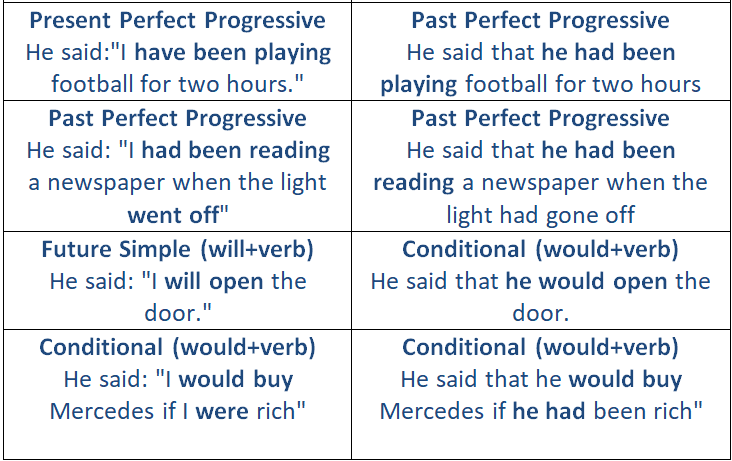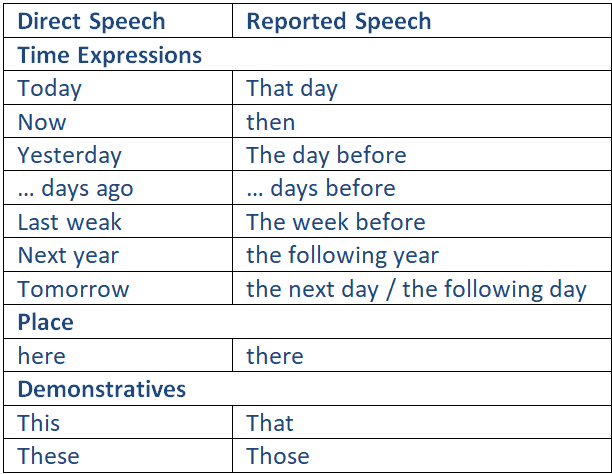


 Grammar
Grammar
 Tenses
Tenses
 Present
Present
 Past
Past
 Future
Future
 Parts Of Speech
Parts Of Speech
 Nouns
Nouns
 Verbs
Verbs
 Adverbs
Adverbs
 Adjectives
Adjectives
 Pronouns
Pronouns
 Pre Position
Pre Position
 Preposition by function
Preposition by function 
 Preposition by construction
Preposition by construction
 Conjunctions
Conjunctions
 Interjections
Interjections
 Grammar Rules
Grammar Rules
 Linguistics
Linguistics
 Semantics
Semantics
 Pragmatics
Pragmatics
 Reading Comprehension
Reading Comprehension|
Read More
Date: 17-6-2021
Date: 17-6-2021
Date: 17-6-2021
|
Reported Speech (Indirect Speech)
What is reported speech?
Reported speech is when you tell somebody else what you or a person said before.
Distinction must be made between direct speech and reported speech.
Direct speech vs Reported speech:

Different types of sentences
When you use reported speech, you either report:
Statements
questions
requests / commands
other types
A. Reporting Statements
When transforming statements, check whether you have to change:
Pronouns
tense
place and time expression
1- Pronouns
In reported speech, you often have to change the pronoun depending on who says what.
Example:
She says, “My dad likes roast chicken.” – She says that her dad likes roast chicken.
2- Tenses
If the sentence starts in the present, there is no backshift of tenses in reported speech.
If the sentence starts in the past, there is often backshift of tenses in reported speech.

Do not change the tense if the introductory clause is in a present tense (e. g. He says). Note, however, that you might have to change the form of the present tense verb (3rd person singular).No backshift
Example:
He says, “I write poems.” – He says that he writes English.
Backshift
You must change the tense if the introductory clause is in a past tense (e. g. He said).
Example:
He said, “I am happy.” – He said that he was happy.
Examples of the main changes in tense:


The modal verbs could, should, would, might, needn't, ought to, used to do not normally change.
Example:
He said, "She might be right." – He said that she might be right.
Other modal verbs may change:

3- Place, demonstratives and time expressions
Place, demonstratives and time expressions change if the context of the reported statement (i.e. the location and/or the period of time) is different from that of the direct speech.
In the following table, you will find the different changes of place; demonstratives and time expressions.

B. Reporting Questions
When transforming questions, check whether you have to change:
Pronouns
place and time expressions
tenses (backshift)
Also note that you have to:
. transform the question into an indirect question
. use the question word (where, when, what, how) or if / whether

C. Reporting requests / commands
When transforming requests and commands, check whether you have to change:
Pronouns
place and time expressions

Tenses are not relevant for requests – simply use to / not to + verb (infinitive without "to")
Example:
She said, “Sit down." - She asked me to sit down.
She said, "don't be lazy" - She asked me not to be lazy
For affirmative use to + infinitive (without to)
For negative requests, use not to + infinitive (without to).
D. Other transformations
Expressions of advice with must, should and ought are usually reported using advise / urge.
Example:
"You must read this book."
He advised / urged me to read that book.
The expression let’s is usually reported using suggest. In this case, there are two possibilities for reported speech: gerund or statement with should.
Example:
"Let’s go to the cinema."
1. He suggested going to the cinema.
2. He suggested that we should go to the cinema.
Main clauses connected with and/but
If two complete main clauses are connected with ‚and or ‚but, put ‚that after the conjunction.
Example:
He said ,“I saw her but she didn't see me.“ – He said that he had seen her but that she hadn't seen him.“
If the subject is dropped in the second main clause (the conjunction is followed by a verb), do not use ‚that‘.
Example:
She said,“I am a nurse and work in a hospital.“ – He said that she was a nurse and worked in a hospital.“
|
|
|
|
مخاطر عدم علاج ارتفاع ضغط الدم
|
|
|
|
|
|
|
اختراق جديد في علاج سرطان البروستات العدواني
|
|
|
|
|
|
|
مدرسة دار العلم.. صرح علميّ متميز في كربلاء لنشر علوم أهل البيت (عليهم السلام)
|
|
|